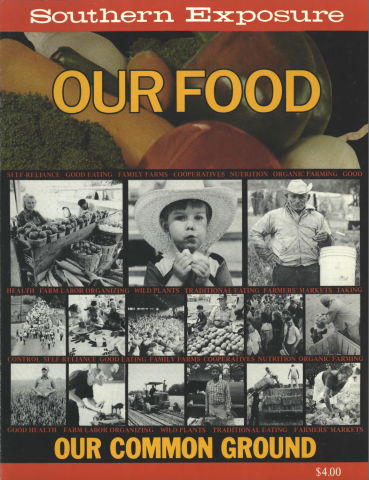Eat For Good Health

This article originally appeared in Southern Exposure Vol. 11 No. 6, "Our Food." Find more from that issue here.
Good nutrition is a key component of wellness, as the preceding interview with Dr. James Carter makes clear. Malnutrition is known to increase the body’s susceptibility to infection and retard its ability to recover. Specific nutrient deficiencies and excesses have been linked to conditions such as hypertension (high blood pressure), heart disease, and cancer.
Certain vitamins, minerals, and other substances are often touted as “magic” cures or productive agents. Vitamin C, selenium, chromium, vitamin E — these are a few popular supplements marketed as miracle cures. While these compounds are all essential to the body, it is important to remember that they are readily available in food and are amply provided in a balanced diet. Excessive consumption via supplements such as these, however, can have toxic consequences.
What should a “balanced” diet include? We do know that the “typical American diet” is not balanced, it is too high in fat (especially animal fat), sugar, salt, and often calories. On the other hand, it is too low in fiber, vitamins such as A, C, and folate, and minerals such as calcium, iron, potassium, and zinc. Correcting these imbalances means changing eating habits.
Nutritionists generally categorize foods as belonging to one of four basic food groups. The consumer of the “typical American diet” would do well to make some changes in what she or he eats from each group, in the interest of better health and a more balanced diet.
In the milk and milk products group, eat more of the low-fat products: skim or low-fat (1 percent) milk and low-fat yogurt, cottage cheese, and cheese. Drink less whole milk, except for infants who need the extra fat content. Eat less butter, cream cheese, and ice cream.
In the protein group, get more of your protein from legumes (dried beans and peas) combined with whole grains to provide complete protein. The beef, chicken, turkey, and fish you eat should be lean. Consume fewer fatty cuts of meat, fried meats and fatback, and processed meats like sausage, hot dogs, bologna, and so forth.
In the fruits and vegetables group, eat more fresh produce of all kinds, especially citrus fruit and dark green and yellow fruits and vegetables. Use fewer canned products that are processed with salt and/or sugar.
In the breads and cereals group, eat more whole-grain bread and flour, whole-grain cereals like wheat, oats, and rye, and brown rice and millet, and less white bread and flour, presweetened cereals, white rice, and bakery goods made with white flour and sugar.
Drink more water and cut way down on white sugar, salt, and the caffeine in coffee, tea, and soft drinks, substituting molasses, honey, and caffeine-free beverages. □
Tags
Marci Kramish
Marci Kramish, R.D., M.P.H., is a clinical associate with the Department of Community and Family Medicine of Duke University Medical Center. (1983)